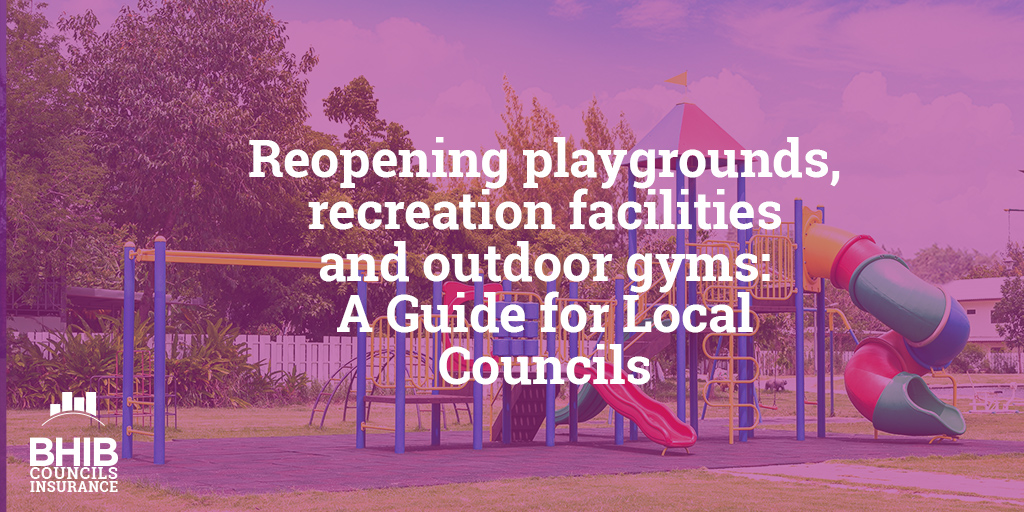Update – 22 March 2021
As per the UK Government’s ‘Roadmap out of lockdown’, outdoor gyms and sports facilities such as tennis and basketball courts, and open-air swimming pools, will be allowed to reopen from Monday 29 March 2021.
To help local and parish councils prepare their outdoor activity areas ahead of the reopening, we have produced a free risk assessment template which can be downloaded below:
Reopening outdoor gyms and playgrounds – COVID-19 Risk Assessment
To further assist councils, we also have a detailed guide on reopening playgrounds, recreation facilities, outdoor gyms and public toilets, which you can read below or download here: Reopening playgrounds, recreation facilities, outdoor gyms and public toilets: A guide for local councils.
Read more:
Coronavirus: Expectations of councils regarding playgrounds and outdoor fitness equipment
6 tips for local councils to tackle increased vandalism during the coronavirus lockdown
The importance of playground inspections
Free risk assessment templates
Playgrounds are an essential asset in communities as they provide children with stimulating activities and encourage exercising and learning through play. Making them available provides important development opportunities for children.
Playgrounds and outdoor gyms are currently closed under the Health Protection (Coronavirus, Restrictions) (England) Regulations 2020.
This guidance provides local councils or those responsible for playgrounds and outdoor gyms with practical advice on how these can be reopened safely and managed effectively to reduce the risk of COVID-19 transmissions.
For more general help and advice, see our COVID-19 risk assessments for reopening council buildings and workplaces.
Please note: It is recognised that local councils or those responsible for playgrounds will require time to prepare for a safe reopening and therefore it is at the discretion of these individuals as to whether they reopen straight away.
Advice changes on a daily basis so keep up to date with the news, government and HSE websites. For full Government guidance on re-opening playgrounds, click here.
If you have any queries about the information in this guide, please feel free to contact the team at [email protected].
Guidance for safely reopening playgrounds, outdoor gyms and public toilets
1. Carry out a Risk Assessment
Those responsible must assess and manage the potential risk of COVID-19 transmissions to protect the general public, staff and workers.
They must ensure that the risk assessment for the playground or outdoor gym addresses the risks of COVID-19, using this guidance to inform decisions and control measures. Download our FREE risk assessment here.
Playgrounds and outdoor gyms come in a wide variety of formats, some are small and may be a single piece of equipment whereas some are large and incorporate a number of structures. Some playgrounds/outdoor gyms are in enclosed areas with fencing while others are not. Those responsible need to consider the unique layout of their playground/outdoor gym when conducting a risk assessment.
2. Social Distancing
Following a review of social distancing guidance, social interaction between people needs to be at 2 metres or 1 metre (where 2 metres is not viable).
Those responsible should consider how to put in place measures to support social distancing, such as notices and signs to remind users of the need to adhere to social distancing in accordance with existing government guidance.
Potential measures to facilitate social distancing include:
- If the area is enclosed, an advisory limit should be identified on the maximum number of users able to use a playground or outdoor gym area at any one time and use signs to communicate this.
- Where practicable, implement a booking system so that users can book a slot to use the equipment.
- Limit the number of users able to use a particular piece of equipment to minimise the transmission risk of COVID-19. Potential measures include:
- Signs to communicate maximum number of users at one time
- Request those using the play area to only have one family member accompanying a child
- Limiting the available number of seats on equipment or numbers of swings available to promote social distancing
- Setting a time limit and using signs to communicate this to users, parents, guardians or carers
- Using adjacent space for queues or waiting areas for users, parents, guardians and carers using barriers, markings or signs where it is safe to do so
- For outdoor gyms – the introduction of a clearly marked one-way system around the fixtures/machines, to help prevent users from coming into close contact with each other.
- For outdoor gyms – where machines and equipment are less than 2 metres apart, pieces of equipment should be moved to allow social distancing measures to be adhered to if possible.
3. Cleaning and hygiene
It is suggested that the virus can survive for several days on some hard surfaces, particularly when indoors. These risks are reduced when outdoors, where surfaces may be subject to UV light and/or rain.
Those responsible are advised to manage any potential risk, cleaning high-traffic touchpoints frequently. This could include cleaning regimes for:
- playground equipment for children, usually up to age 14, such as slides, monkey bars and climbing frames
- semi-enclosed playhouses or huts for small children
- enclosed crawl-through ‘tunnels’ or tube slides
- exercise bars and machine handles on outdoor gym equipment
- entry and exit points such as gates
- seating areas such as benches and picnic tables
- refuse areas/bins
Those responsible should encourage effective sanitation by users, parents, guardians and carers.
The Government has recommend the following:
- using signs and posters:
- to promote cleaning of equipment by users, parents, guardians and carers
- encouraging outdoor gym users to bring their own towel and hygiene products and wipe down equipment after use
- encouraging parents to bring hand sanitiser gel or wipes to clean their children’s hands
- to promote and remind users, parents, guardians and carers of the need for social distancing
- when communicating safety messages, those responsible should ensure messages are able to reach those with hearing or vision impairments. Consideration should also be given on how to assist those with disabilities with complying with the changes.
- providing more waste facilities and more frequent rubbish collection
- where practicable, providing hand sanitiser (automated where possible) or hand washing facilities at the entry and exit points, in addition to public toilets/washrooms
- using disposable paper towels in handwashing facilities where possible
4. Public toilets
Public toilets, portable toilets and toilets inside premises should be kept open and carefully managed to reduce the risk of transmission of COVID-19.
The Government recommend the following:
- using signs and posters to build awareness of good handwashing technique
- consider the use of social distancing markings in areas where queues normally form, and the adoption of a limited entry approach, with one in, one out
- to enable good hand hygiene, consider making hand sanitiser available on entry to toilets where safe and practical
- setting clear use and cleaning guidance for toilets, with increased frequency of cleaning in line with usage
- keep the facilities well ventilated, for example by fixing doors open where appropriate
- special care should be taken for cleaning of portable toilets and larger toilet blocks
- putting up a visible cleaning schedule can keep it up to date and visible
- providing more waste facilities and more frequent rubbish collection
5. Face coverings
Current government guidance states that face coverings should not be used by children under the age of 3 or those who may find it difficult to manage them correctly.
Parents should be aware that wearing a face covering in a playground setting could pose an additional safety risk and should use their judgement on whether their children wear a face covering.
More information
Advice changes on a daily basis so keep up to date with the news, government and HSE websites. For full Government guidance on re-opening playgrounds, click here.
If you would like more help, drop us a line at [email protected]
Frequently Asked Questions for Reopening Playgrounds
Q. What records should I keep?
- Copy of the completed risk assessment
- Copies of invoices in respect of the cleaning work
- Copy of the inspection report
- Take some photos showing the conditions of the premises/equipment
Q. Do we have to get a qualified person in to inspect playgrounds?
Having a qualified person would be useful, but the legislation refers to the phrase “competent”, so qualifications are not a legal requirement. Competent, in this sense, means “an employee who is able to recognize hazards associated with a particular task, and has the ability to mitigate those hazards”.
Q. Do we have to provide additional safety measures for users during the COVID-19 pandemic?
The measures you decide to put in place will be determined by your risk assessment. Your thought process, based on the risk, will determine what measures you consider necessary and commensurate with the risk.
Q. Should numbers be limited and if so how?
You can try and limit numbers by displaying signs advising the maximum number of people allowable at any one time. However, unless you can police this you have to rely on people adhering to it and applying common sense.
Q. Can I be sued if someone caught COVID-19 and allege they caught it from our equipment?
There is nothing to stop someone suing the council if they consider they caught COVID-19 as a result of the council’s perceived negligence. However, unless someone can prove, beyond reasonable doubt, that they contracted COVID-19 at a given place on a certain date, it will be difficult to validate claims.





